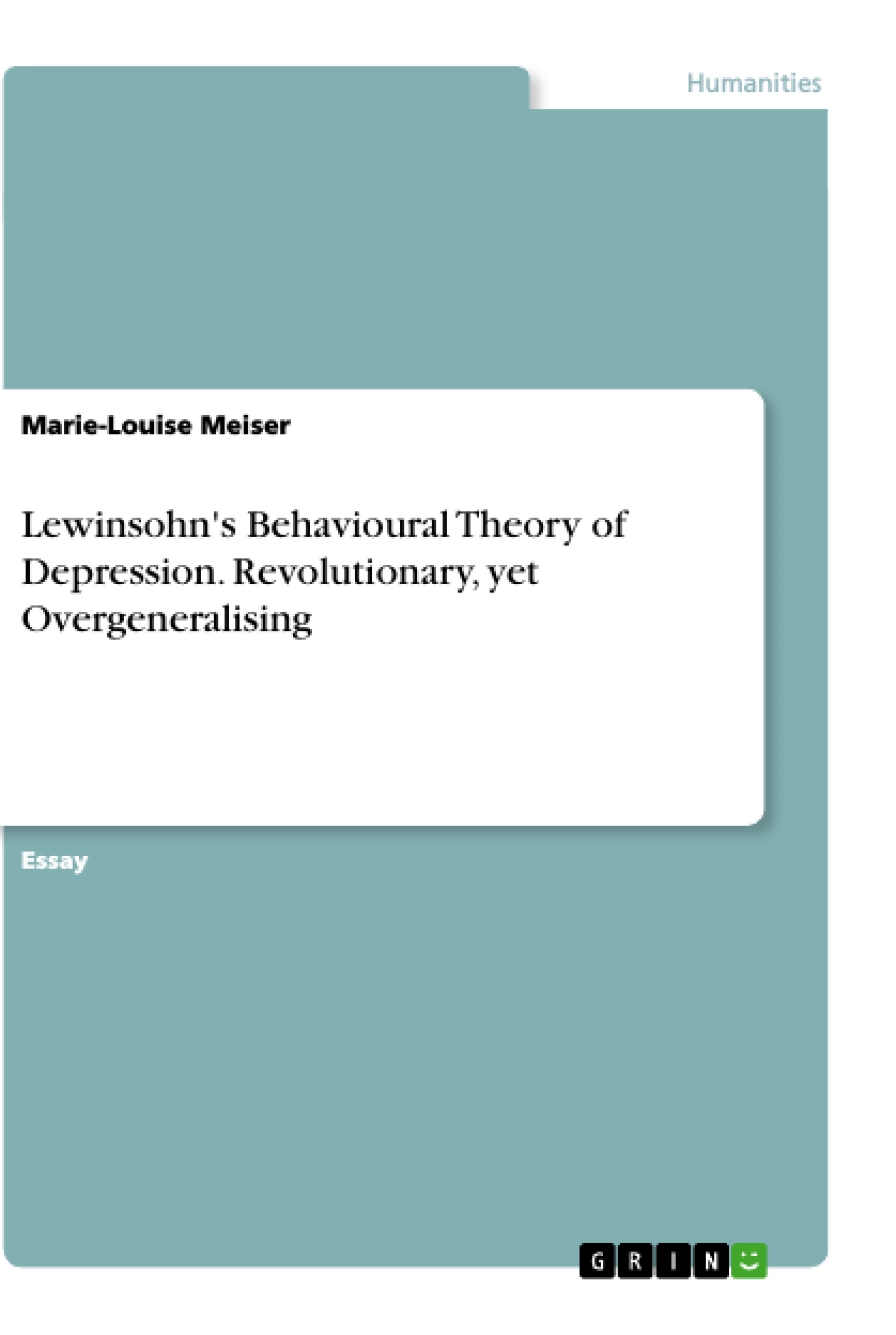In order to evaluate Lewinsohn’s theory of depression, his three hypotheses will be examined by drawing from empirical research studies and alternative psychological theories. It is proposed that Lewinsohn’s early behavioural theory was revolutionary for our understanding of the aetiology and symptomatology of depression, but overgeneralises the heterogeneity of the disorder.
According to Lewinsohn’s theory, depression is caused by a low, or lack of response-contingent positive reinforcement, meaning that insufficient reinforcement causes a reduction of behaviours as well as dysphoria which characterise the main symptoms of depression.
There are three hypotheses about how a lack of reinforcement arises: Firstly, the environment does not provide sufficient reinforcement; secondly, the individual does not obtain the necessary social skills to receive reinforcement in an environment in which it is actually available; and thirdly, even though the individual obtains reinforcement, they are unable to enjoy it.When one of these antecedents arises, maladaptive behaviours follow, which themselves lead to lack or loss of positive reinforcement or receiving negative reinforcement.
Table of Contents
- Lewinsohn's Theory: A Revolutionary Approach to the Understanding of Depression
- Lewinsohn's Theory: An Overgeneralisation of Depression
Objectives and Key Themes
This paper critically evaluates Lewinsohn's behavioral theory of depression, examining its revolutionary contributions and limitations. It assesses whether the theory's three core hypotheses align with current empirical research and considers alternative explanations for the heterogeneity of depression.
- Lewinsohn's behavioral theory of depression and its historical significance.
- The three hypotheses of Lewinsohn's theory: insufficient environmental reinforcement, social skills deficits, and inability to enjoy reinforcement.
- Empirical evidence supporting and challenging Lewinsohn's hypotheses.
- The limitations of Lewinsohn's theory in explaining the complexity of depression.
- Alternative theoretical perspectives on the causes and maintenance of depression.
Chapter Summaries
Lewinsohn's Theory: A Revolutionary Approach to the Understanding of Depression: This chapter explores the revolutionary aspects of Lewinsohn's theory, focusing on how his hypotheses – insufficient environmental reinforcement, social skills deficits, and inability to enjoy reinforcement – advanced the understanding of depression. It examines supporting empirical studies, such as research linking job loss to depression, the correlation between social skills deficits and loneliness, and the role of social anxiety in hindering the enjoyment of social reinforcement. While acknowledging limitations in some studies (e.g., self-reported data, sampling biases), the chapter argues that Lewinsohn's work significantly impacted our understanding of depression's antecedents and maintenance through the concept of reinforcement and its role in the three-term contingency model. Specifically, it highlights how the theory explained both reactive and chronic depression by focusing on the interplay between environmental factors, individual skills, and the ability to experience positive reinforcement.
Lewinsohn's Theory: An Overgeneralisation of Depression: This chapter critically assesses the limitations of Lewinsohn's theory. It argues that while the theory offers valuable insights into some aspects of depression, its three core hypotheses oversimplify the disorder's complexity. It highlights the heterogeneity of depression's causes and symptoms and suggests that a more nuanced approach is needed to fully understand the disorder. The chapter implicitly proposes that alternative theoretical perspectives might be necessary to complement Lewinsohn's model, suggesting that the theory, while groundbreaking, is insufficient to account for the breadth of factors contributing to depression.
Keywords
Lewinsohn's theory, depression, behavioral theory, reinforcement, social skills, social anxiety, environmental factors, reactive depression, chronic depression, empirical research, limitations, heterogeneity.
Frequently Asked Questions: A Critical Evaluation of Lewinsohn's Behavioral Theory of Depression
What is the focus of this document?
This document provides a comprehensive overview and critical evaluation of Lewinsohn's behavioral theory of depression. It examines the theory's strengths, limitations, and its place within the broader understanding of depression.
What are the main components of Lewinsohn's theory?
Lewinsohn's theory posits three core hypotheses: insufficient environmental reinforcement, social skills deficits, and an inability to enjoy reinforcement. These factors are considered key contributors to the development and maintenance of depression.
What are the key themes explored in the document?
The document explores the historical significance of Lewinsohn's theory, examines empirical evidence supporting and challenging its hypotheses, discusses the limitations of the theory in explaining the complexity of depression, and considers alternative theoretical perspectives.
What evidence supports Lewinsohn's theory?
Supporting evidence includes research linking job loss to depression, correlations between social skills deficits and loneliness, and the role of social anxiety in hindering the enjoyment of social reinforcement. However, limitations exist in some studies due to factors like self-reported data and sampling biases.
What are the limitations of Lewinsohn's theory?
The document argues that while Lewinsohn's theory offers valuable insights, it oversimplifies the complexity of depression. The heterogeneity of depression's causes and symptoms suggests a need for a more nuanced approach, possibly incorporating alternative theoretical perspectives.
How does Lewinsohn's theory explain both reactive and chronic depression?
The theory explains both forms by focusing on the interplay between environmental factors, individual skills, and the ability to experience positive reinforcement. The lack of sufficient reinforcement, inadequate social skills, or an inability to enjoy positive experiences can contribute to both reactive (triggered by specific events) and chronic (long-lasting) depression.
What alternative perspectives are considered?
The document implicitly suggests that alternative theoretical perspectives are necessary to complement Lewinsohn's model, acknowledging its limitations in fully accounting for the diverse factors contributing to depression.
What are the key takeaways from this document?
Lewinsohn's theory, while groundbreaking, provides an incomplete picture of depression. While its hypotheses offer valuable insights, a more comprehensive understanding requires consideration of the disorder's heterogeneity and the integration of additional theoretical perspectives.
What are the keywords associated with this document?
Lewinsohn's theory, depression, behavioral theory, reinforcement, social skills, social anxiety, environmental factors, reactive depression, chronic depression, empirical research, limitations, heterogeneity.
What is included in the Table of Contents?
The table of contents includes: "Lewinsohn's Theory: A Revolutionary Approach to the Understanding of Depression" and "Lewinsohn's Theory: An Overgeneralisation of Depression."
- Quote paper
- Marie-Louise Meiser (Author), 2020, Lewinsohn's Behavioural Theory of Depression. Revolutionary, yet Overgeneralising, Munich, GRIN Verlag, https://www.grin.com/document/1026090




